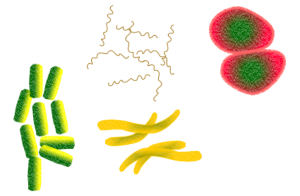Why Parkinson’s is Linked to Abnormal Gut Bacteria
 Parkinson’s disease is a nerve and brain condition, but it has everything to do with gut bacteria. This has been proven out in recent studies. The question now is, how does abnormal gut bacteria create a ripe condition for Parkinson’s?
Parkinson’s disease is a nerve and brain condition, but it has everything to do with gut bacteria. This has been proven out in recent studies. The question now is, how does abnormal gut bacteria create a ripe condition for Parkinson’s?
In this article
Uncovering the Parkinson’s gut bacteria link
Since the early 1990s, medical science began to link Parkinson’s disease with gut conditions. Back then, researchers from the University of Nebraska Medical Center published a paper in the medical journal Neurology after finding numerous Parkinson’s cases among those with gastrointestinal issues, including constipation, nausea, gut inflammation, acid reflux and other GI issues.
You see, the researchers knew these were all symptoms of abnormal gut bacteria.
Continuing clinical examinations of Parkinson’s patients at the University of Nebraska’s Medical Center found that the motor conditions related to Parkinson’s disease also correlated with problems with the vagus nerve, the rectum and the pelvic floor.
The vagus nerve runs from the brain to the gut.
These studies also identified dopamine receptors within with lower esophageal sphincter – which opens and closes the stomach to food.
Fast-forward another decade. In 2011, research from the University of Tennessee Health Science Center picked up this association between Parkinson’s and the gut. They found additional correlations with digestion, salivation issues and rectum problems, along with the other symptoms found earlier.
The research also discussed a condition called gastroparesis – where the stomach doesn’t empty properly.
As GI problems like these began to become increasingly associated with gut issues, the search turned to whether Parkinson’s may be associated with problems with gut bacteria.
Unhealthy microbiome linked to Parkinson’s
In 2015, research from the Department of Neurological Sciences at the University of Helsinki – along with doctors at the University Central Hospital – decided to study the bacteria of Parkinson’s patients and compare them with healthy patients.
The researchers investigated gut bacteria among 72 Parkinson’s patients along with 72 healthy human control subjects. The scientists analyzed the feces of each of the subjects and ran sequencing scans in order to determine the genetics of their microbiome.
A microbiome is the cumulative genetic contents of a person’s intestinal bacteria as gauged through the analysis of feces. It determines the overall type of species that are inhabiting the gut.
Over the years, microbiologists have been tracking these different species to determine whether they are healthy or disease-causing. Healthy bacteria are called probiotics, while disease-causing bacteria are often called pathobiotics, or pathogenic bacteria.
At any rate, the Swedish researchers analyzed the microbiomes of the healthy people and compared them with the people with Parkinson’s disease to see if there were any differences.
The results were surprising. The scientists found that on average Parkinson’s disease patients had about 23 percent less Prevotella species compared with the healthy subjects. They also found that those with fewer Prevotella species had significantly higher incidence of Parkinson’s.
Prevotella species have been associated in other research with healthy gut bacteria.
The research also found that the Parkinson’s patients had significantly more bacteria in the Enterobacteriaceae family. The Enterobacteriaceae family includes disease-causing bacteria such as Escherichia coli, Yersinia pestis, Klebsiella, Citrobacter, Shigella, Proteus, Salmonella, Enterobacter and Serratia species of bacteria. These cause a myriad of diseases throughout the digestive tract and around the body.
But how does a bad microbiome produce Parkinsons’?
A 2017 study has revealed at least one of the major reasons why the gut microbiome can produce Parkinson’s. Researchers from the University of Alabama at Birmingham tested 197 Parkinson’s disease patients along with 130 healthy control subjects. To offset for local diets, the study tested people from the South, people from the Northeast and people from the Northwest. The researchers tested each person’s gut bacteria and analyzed the different species that populated each person’s gut.
The findings were eye-opening.
First, the study once again established that Parkinson’s disease patients have abnormal populations of gut bacteria compared to healthy people. But it was the particular species of bacteria that became the most revealing aspect. Dr. Haydeh Payami, a neurology professor in the school of medicine at the University of Alabama explained:
“Our study showed major disruption of the normal microbiome — the organisms in the gut — in individuals with Parkinson’s.”
The researchers found that probiotic species that are involved in helping the body remove toxic chemicals from the body were glaringly low among the Parkinson’s disease patients. Probiotic families at lower levels included:
• Bifidobacteriaceae
• Christensenellaceae
• Lachnospiraceae
• Lactobacillaceae
• Pasteurellaceae
• Verrucomicrobiaceae
This is significant. Why? Because other research has linked Parkinson’s disease to the exposure of chemicals in pesticides and other consumer products.
Think about it. Let’s say that you have a castle in enemy territory that is protected on all sides by a big wall manned with armed soldiers. Now let’s say the walls and the guards are knocked out by some bombs. What do you have? You have a defenseless castle, ripe to let the enemy flood in.
Most of us miss the fact that our probiotics form a lethal defense system that helps protect our body from all sorts of environmental toxins. Have you ever wondered why not everyone suffers when there is a toxic exposure event? The difference relates to those with a better microbiome defense.
Probiotics also help brain function
The link between the gut and the brain is no longer that big of a reach. For years, scientists have been investigating the gut-brain axis connection. Many mood-related and neurological conditions have now been linked with gut bacteria.
Other research has found that probiotic bacteria can increase levels of important neurotansmitters such as dopamine and serotonin. More specifically, a reduction of dopamine and its related norepinephrine is one of the hallmark symptoms of Parkinson’s disease. When there isn’t enough dopamine to provide smooth nerve impulses between the parts of the brain that control motor movement, coordination and motor control begin to deteriorate.
One of the greatest suppliers of dopamine within the brain is the substantia nigra. During the progression of Parkinson’s, neurons in this part of the brain are damaged, which decreases the availability of dopamine. This damage is often related to the existence of Lewy bodies within these areas – so it is assumed Lewy bodies are involved in the progression of Parkinson’s.
I might add that University of Nebraska researchers also linked increased levels of Lewy bodies with increased pathogenic bacteria in the gut.
SIBO and Parkinson’s
The enemies of probiotics are the pathogenic bacteria, which fight for territory within the gut. When the pathogenic bacteria win this competition, it often results in what medical researchers call SIBO – small intestine bacteria overgrowth.
In 2011, researchers from Rome’s Catholic University of Sacred Heart studied 48 Parkinson’s patients along with 36 healthy control human subjects. They found that while only a little over 8 percent of the healthy controls had clear evidence of small intestine bacteria overgrowth, over 54 percent of the Parkinson’s patients had clear evidence of SIBO.
Not everyone with a prevalence of pathogenic bacteria will test positive for SIBO. This is because SIBO symptoms depend largely upon the condition of the gut and the existence of different bacteria species, along with diet and other factors.
This means that it is likely that while half of the Parkinson’s patients had SIBO, many more of the Parkinson’s patients likely had gut bacteria problems or imbalances – as indicated by the microbiome research mentioned above.
Can Parkinson’s disease be treated with probiotics?
Yes. This has recently been proven. But to what degree will it make a difference? Some laboratory research using probiotics has shown improved brain tissue protection and decreased inflammation among brain tissues. But long-term clinical studies on human subjects have been limited. One study, for example, tested 40 Parkinson’s patients with supplementing probiotics for a mere five weeks. But this study was limited to treating their Parkinson’s-related constipation.
The researchers reported the probiotics increased their healthy bowel movements.
Besides, it is pretty unlikely that probiotic supplementation for a few weeks will make any significant impact. The condition takes years of progressive damage to brain neurons. These have been associated with toxins and free radical damage within the brain – as mentioned above.
The question now is whether a few years of significant probiotic treatment could help decrease the symptoms – or at least slow the progression of this condition.
At the very least we know that probiotic supplementation will help the Parkinson’s patient improve bowel movement consistency and frequency – and possibly eliminate the constipation associated with Parkinson’s.
REFERENCES:
Hill-Burns EM, Debelius JW, Morton JT, Wissemann WT, Lewis MR, Wallen ZD, Peddada SD, Factor SA, Molho E, Zabetian CP, Knight R, Payami H. Parkinson’s disease and Parkinson’s disease medications have distinct signatures of the gut microbiome. Mov Disord. 2017 Feb 14. doi: 10.1002/mds.26942.
Scheperjans F, Aho V, Pereira PA, Koskinen K, Paulin L, Pekkonen E, Haapaniemi E, Kaakkola S, Eerola-Rautio J, Pohja M, Kinnunen E, Murros K, Auvinen P. Gut microbiota are related to Parkinson’s disease and clinical phenotype. Mov Disord. 2015 Mar;30(3):350-8. doi: 10.1002/mds.26069.
Gabrielli M, Bonazzi P, Scarpellini E, Bendia E, Lauritano EC, Fasano A, Ceravolo MG, Capecci M, Rita Bentivoglio A, Provinciali L, Tonali PA, Gasbarrini A. Prevalence of small intestinal bacterial overgrowth in Parkinson’s disease. Mov Disord. 2011 Apr;26(5):889-92. doi: 10.1002/mds.23566.
Mulak A, Bonaz B. Brain-gut-microbiota axis in Parkinson’s disease. World J Gastroenterol. 2015 Oct 7;21(37):10609-20. doi: 10.3748/wjg.v21.i37.10609.
Tan AH, Mahadeva S, Thalha AM, Gibson PR, Kiew CK, Yeat CM, Ng SW, Ang SP, Chow SK, Tan CT, Yong HS, Marras C, Fox SH, Lim SY. Small intestinal bacterial overgrowth in Parkinson’s disease. Parkinsonism Relat Disord. 2014 May;20(5):535-40. doi: 10.1016/j.parkreldis.2014.02.019.
Divyashri G, Krishna G, Muralidhara M, Prapulla SG. Probiotic attributes, antioxidant, anti-inflammatory and neuromodulatory effects of probiotic Probiotic attributes, antioxidant, anti-inflammatory and neuromodulatory effects of probiotic Enterococcus faecium CFR 3003: In vitro and in vivo evidences. J Med Microbiol. 2015 Oct 7. doi: 10.1099/jmm.0.000184.
Cassani E, Privitera G, Pezzoli G, Pusani C, Madio C, Iorio L, Barichella M. Use of probiotics for the treatment of constipation in Parkinson’s disease patients. Minerva Gastroenterol Dietol. 2011 Jun;57(2):117-21.
Barboza JL, Okun MS, Moshiree B. The treatment of gastroparesis, constipation and small intestinal bacterial overgrowth in patients with Parkinson’s disease. Expert Opin Pharmacother. 2015 Sep 16:1-16.
Edwards LL, Quigley EM, Pfeiffer RF. Gastrointestinal dysfunction in Parkinson’s disease: frequency and pathophysiology. Neurology. 1992 Apr;42(4):726-32.
Byrne KG, Pfeiffer R, Quigley EM. Gastrointestinal dysfunction in Parkinson’s disease. A report of clinical experience at a single center. J Clin Gastroenterol. 1994 Jul;19(1):11-6.
Pfeiffer RF. Gastrointestinal dysfunction in Parkinson’s disease. Parkinsonism Relat Disord. 2011 Jan;17(1):10-5. doi: 10.1016/j.parkreldis.2010.08.003.
Pfeiffer RF. Gastrointestinal dysfunction in Parkinson’s disease. Clin Neurosci. 1998;5(2):136-46.















